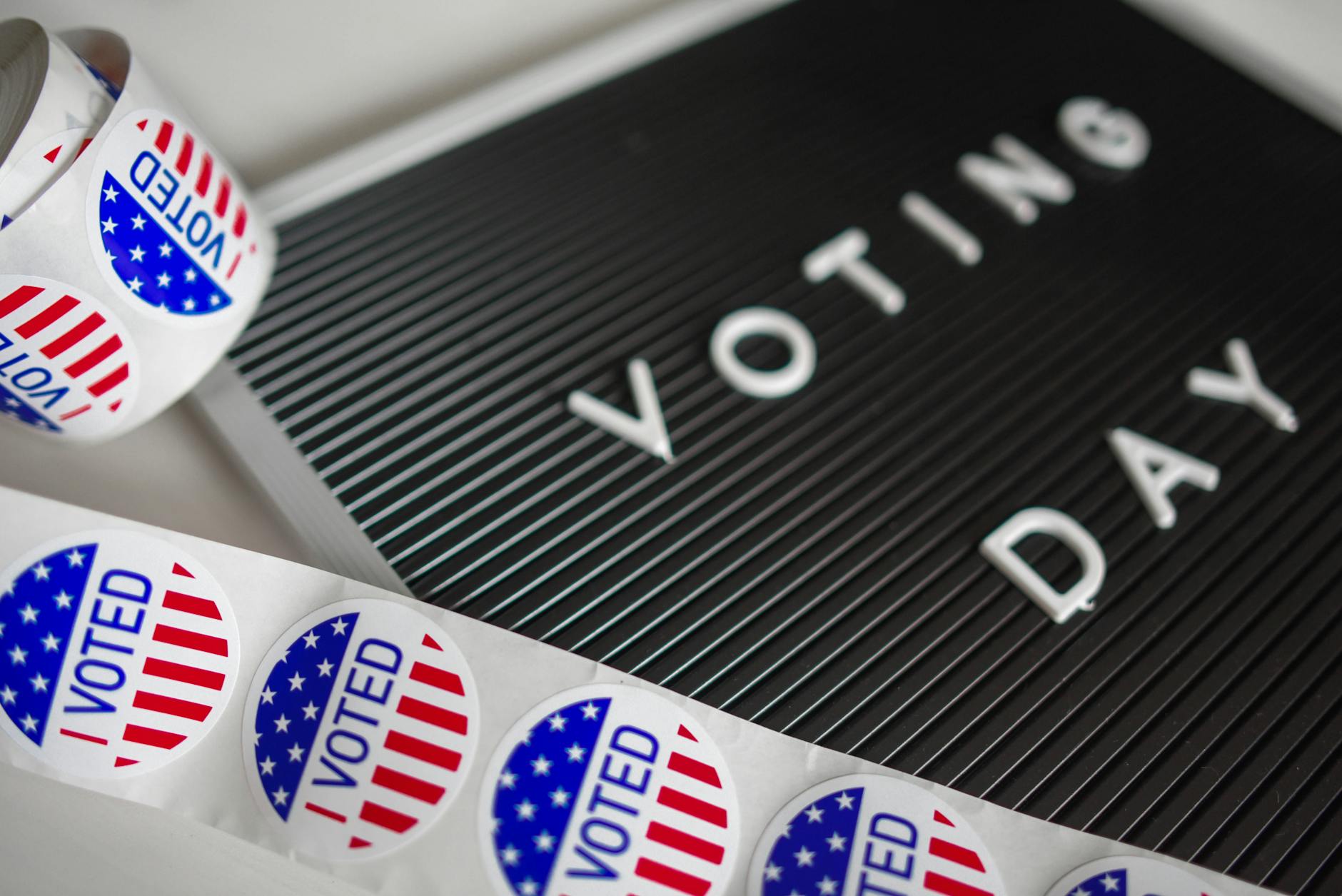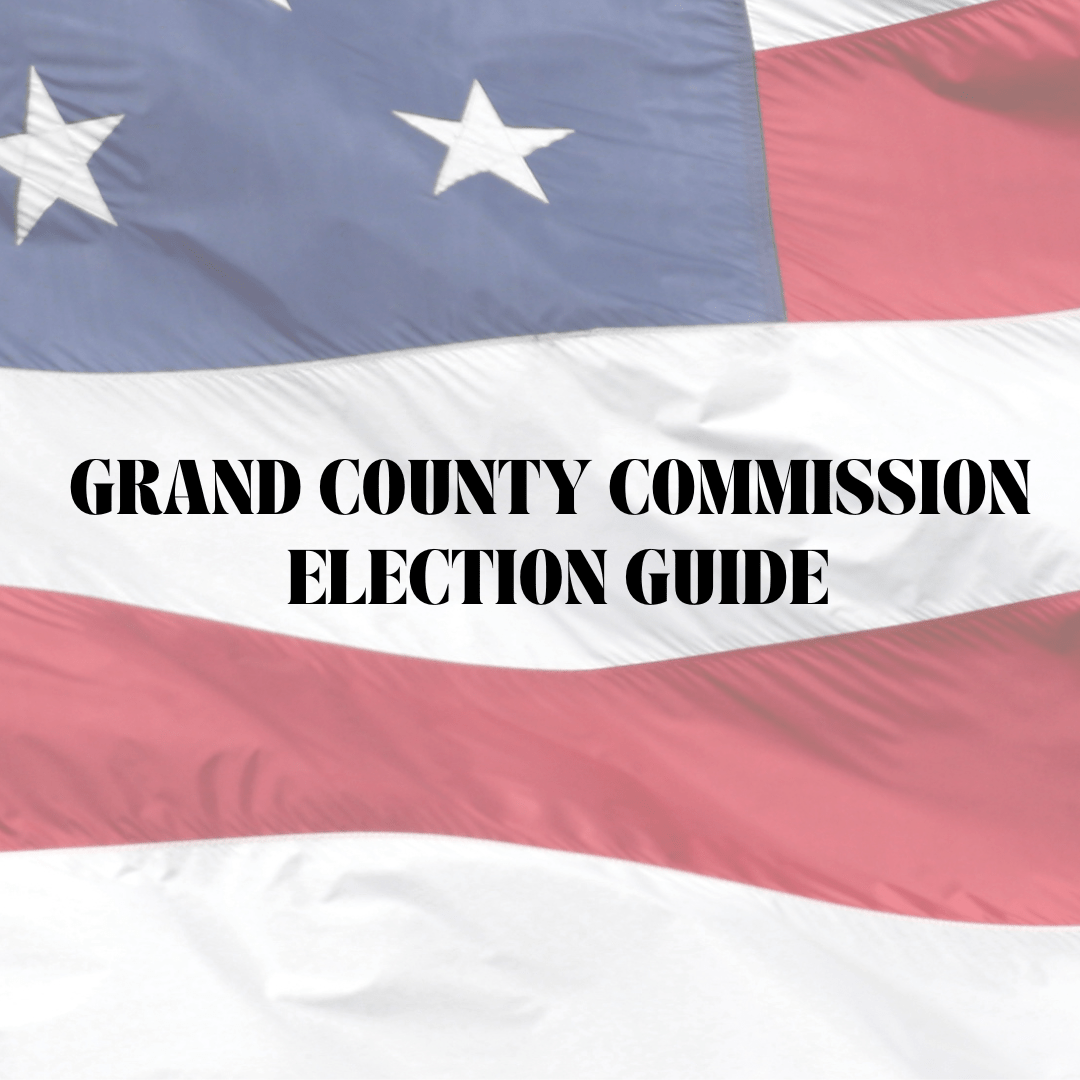November 8 is Election Day, but your mail-in ballot should be arriving soon—why wait to learn more about this year’s candidates?
This week, we spoke to candidates for the three Grand County Commission seats up for election this year: Emily Campbell and Bill Winfield running for Commission At-large, Lori McFarland and Mary McGann running for District 4, and Steve Getz and Mike McCurdy running for District 5.
Voting Information
Grand County conducts elections through mail-in ballots, so you and all our local voters can take the time to get informed on the candidates before making your choice. Voters can mail back the ballot postmarked no later than November 7 or drop it off at the Grand County Clerk’s office within the County Administration office (125 E. Center Street, Moab) by 8 p.m. on Election Day, November 8.
Ballots were sent around October 18. If you are a registered voter and have not received your ballot, call 435-259-1321.
The last day to register to vote and receive a ballot by mail is October 28. There will be an in-person voting period from November 2 to 7 from 9 a.m. to 4 p.m. at the Clerk’s office. The office will also be open for in-person voting on Election Day from 7 a.m. to 8 p.m.
Curious about ballot security? Read the Grand County Clerk’s office election policy and procedures at www.grandcountyutah.net/904/Vote-by-Mail.
Click the map to make it larger!


Emily Campbell
What’s your history in Grand County? What sort of work have you done professionally? What made you decide to get involved with local government?
I’ve lived in Grand County for a third of my life. My husband Jeff and I met as river guides and our boys attend HMK. I’m running for the same reason I volunteered to serve on the Planning Commission six years ago. Things are changing fast. I hear the same challenges no matter who I talk to: the lack of housing, the perception we’re losing our sense of community, and how our infrastructure and quality of life are not keeping up with growth. I intend to address these challenges head on instead of kicking the can down the road to our kids. I have deep experience and relationships across the community to draw from. My experience in economics makes me objective, quantitative, and fiscally responsible. I volunteer in the community as a soccer coach, as chair of the County Planning Commission, on the Economic Development Advisory Board, and the PTA. And I bring an open mind and a track record of getting things done by working with others. On the Planning Commission, I’ve worked well with both conservative and progressive members. We all lose out if we refuse to listen to each other’s ideas simply because we prefer our own.
What’s an example of a great ordinance or political move you’ve seen in the last few years here in Grand County? What is one you believe was a misstep?
I think the county has started to wake up to the urgency of the housing crisis and we finally have homes and rentals for locals hitting the market. I supported the decision four years ago to remove hotels and Airbnbs as an automatic “ok” from our commercial and residential zones. And I believe it’s the correct move to offer incentives for people building housing for locals, such as through the High Density Housing Overlay and the recent work from the Planning Commission to recognize and permit tiny homes and mobile dwellings as official residences.
But the county stumbles when they don’t listen closely to the problems people across Grand County are facing, and aren’t inclusive when finding solutions. When our business community and residents don’t feel like the commission is addressing their needs, it makes it harder to work together on anything. And ultimately the residents pay the cost. We are a small population in a small area, and people of all perspectives are feeling the impacts of growth. It is critical that county officials make it a priority to build bridges and listen.
What is your strategy to evaluate whether a proposal or ordinance is worth implementing?
I use an outcome-oriented approach, fueled by community input.
To start, I want to ensure we understand the problems we are targeting. For example, maybe we want to urgently address the lack of rentals available to locals. I also want to know upfront what we think a good outcome looks like, what constraints we have, and what might stand in the way of success. For example, if we pass this ordinance will people actually build that type of rental? What incentives might make it more likely? What might be the impact on existing residents and businesses, and are we sure we aren’t incentivizing adverse effects? Is the cost justifiable?
If something is just nice words on paper without a likelihood of actual success, we should rework it.
And finally I believe we benefit from critical discussion and public input. We should beat up our codes before they are law! It’s how we find blind spots and ensure what is passed is intentional and truly the best way to approach a problem. Sometimes this means using pilot programs to bias towards action or to make changes incrementally. Regardless, we should always be learning and evaluating, and seeking to improve what exists.
What three steps would you take in the next year to put our county on a firm footing for the future?
First, I would take urgent action to ensure we have homes and rentals for local workers and families. This could include offering pre-approved plans for ADUs and other homes, which would save thousands of dollars in engineering work for residents building local housing. And we should critically assess the Land Use Code and the permitting process to remove unnecessary hoops that make building housing more expensive or slow the process for no good reason.
Second, I want us to regain local control of the ‘Moab brand’ so it reflects our community. I often hear from visitors “I forget that people live here.” We should educate people that Moab is our home through a strong and consistent campaign, backed by enforcement of speed limits and our local codes. I would work with outfitters and businesses to get the support they need to act even more effectively as our community’s ambassadors to visitors.
Third, we must increase the transparency and responsiveness of government. I intend to expand access to the commission through townhalls and improved social media presence. I believe we need to get residents involved in the process earlier and give people ample time to understand the discussion and weigh in.

Bill Winfield
What’s your history in Grand County? What sort of work have you done professionally? What made you decide to get involved with local government?
I was born in the area and raised in Moab. My father was a uranium miner and rancher, and my mother was left with the chore of trying to raise eight children during a very hard time in Moab’s history. I started working at a very young age in Moab, which led me to get a job in housing construction and so I have been building for the majority of my life. I started my own construction company 20+ years ago and built the company to the point that I had 45 employees. My experience in negotiating large contracts and working through many union negotiations has given me the background needed and the desire to give back to my community by serving in local government. My desire to run for office in Moab is a result of my wanting to give back to my community, help with the many local issues surrounding housing, and give all people in Moab a voice.
What’s an example of a great ordinance or political move you’ve seen in the last few years here in Grand County? What is one you believe was a misstep?
Good: I believe that the HDHO was a good ordinance at the beginning that could have done much more for our unacceptable housing shortage if it had not been limited by so many different ideologies and agendas.
Bad: I believe that the lack of desire to work with all sides on the current problems we are facing from an extremely busy year in tourism, and then an attempt to stop all tourism in a hasty reaction to the many visitors we saw following COVID by not spending TRT taxes on wise advertising has led to what the current Grand County Strategic Development Director has described as a looming economic recession in Moab. [Chris Baird is the county’s strategic development director. -ed.]
What is your strategy to evaluate whether a proposal or ordinance is worth implementing?
I believe that any proposal or ordinance should be considered for the value it has for all sides. We cannot continue to allow our locals to be overrun by a lack of proper planning, nor can we continue to govern with knee-jerk reactions to problems that come from that lack of planning. We must bring all sides to the table and solve our problems, rather than continue to end up in litigation due to the hasty, less-than-well-thought-out governance of our community.
What three steps would you take in the next year to put our county on a firm footing for the future?
1: I would bring all our local business and political leaders into the discussion on what the future needs to look like surrounding the quality of life affecting our locals and businesses regarding the UTV debate. We cannot solve this problem by leaving half of those involved feeling like they need to litigate, nor can we allow our locals’ lives to be so inundated that people threaten to take matters into their own hands.
2: I would put a higher priority on solving our unacceptable housing shortage. We must start addressing solid solutions many are waiting for, hoping that something will get accomplished by increasing our stock of available housing. The current idea of a housing overlay, although not perfect, will help many while we work towards increasing our housing supply.
3: We must maintain a healthy economic base so our children and grandchildren can have the option to follow their career choices locally rather than looking elsewhere. Yes, housing, water, and better transparency in local government are all issues candidates are heralding but if we do not maintain a stable economy we will continue to export our youth and that must not happen.
In closing, we must put people before politics.





